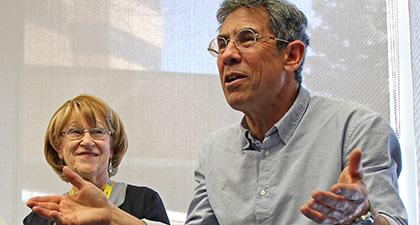Bernard always shows up with the best sweaters. He is a fine-looking man, always well turned-out. He and his wife Susan come every Tuesday afternoon to my storytelling circle in the library.
I work as the storyteller-in-residence at Baycrest Health Sciences in Toronto, and the library program has been running for more than a year. We’ve gotten to know each other through our stories. We know who comes from where, and who was in the war, and who had a close encounter with a grizzly bear. We know that Kensington Market pickles used to cost a nickel, and we know that Gilda’s hair turned green once, and that love brought her from Brazil to Canada.
And we always notice Bernard’s beautiful sweaters.
Bernard had a debilitating stroke, and we aren’t sure how much of the storytelling he responds to. We do know he loves music, and often opens his eyes with great interest to listen to a song. His wife Susan, undaunted by their new and unexpected life circumstances, chooses clothes that show us the handsome, sweet-tempered man she knows him to be, even through the immobility and non-communication caused by the stroke.
A few months ago Susan wrote and told a memoir about her husband, memorably describing him as a man “easy to love.” We heard the story about how he was sent from England as a young Jewish boy during the war, and wound up in Edmonton. The first family that took him in was Christian, and he respectfully pointed out that he should probably be with a Jewish family instead. The second family was Jewish, and loved him so much they were reluctant to hand him back to his parents after the war.
Inspired by his warm and generous nature, they went on to adopt a little girl. In a letter Susan shared with us, this girl, now a grown woman, wrote to Bernard to thank him for teaching her adoptive parents that they could be good parents. Easy to love, indeed.
Knowing all of this through the stories she has shared, we look at the sweaters he wears and recognize them as symbols of love, patience, and Susan’s incredible dedication to remembering the man he was and is to her. This quiet woman, always herself bien soignée, is fierce in her resistance to the depredations of her husband’s stroke. Bernard’s sweaters are her banners of pure love as she sails with her damaged beloved into unknown waters.
After I commented on the sweater, someone else spoke up. She, too, spoke about noticing Susan’s steadfast, gentle love. Then Hyacinth, a Jamaican staff member, chimed in. She described in sheer, almost biblically poetic language, what it meant to her to see Susan coming to Baycrest every day to be with Bernard. After these spontaneous stories and accolades, I asked Susan what it felt like to know that so many of us had taken note of her care and love for Bernard, and been moved by it, and honoured her for it. “It feels good,” she said. “Very good.”
When I look around our motley crew of listeners and tellers, I think about how many things we now know about each other. All of my regulars know I come from Detroit, and that my mother is from Romania and came over after the war. We know that Heather and her wheelchair-bound husband Leslie come from South Africa. They come faithfully, and when he murmurs his responses in a now-private language, we somehow sense that he’s paying his own kind of attention. When Basil, their old friend from Cape Town, comes to visit the storytelling, Leslie smiles joyously. Arlene comes with her husband Albert. He has kept his smile, his glee and love of people even as he gets confused at times.
Arlene tells wonderful stories about Kensington Market, and Albert likes to talk about the time he tricked an armed robber into running away from their pharmacy. It seems to me that Susan, Arlene, Heather – in fact, many of the wives in my group – are truly, like those mentioned in the Shabbat prayer, “women of valour”. Their deeds of heroism are enacted every day in the wards, clinics, cafeterias, and halls of Baycrest.
The life they are leading now is not the old age they imagined or anticipated. Susan and Bernard had traveled all around the world. Now their orbit is far more limited. All of these women, now that their men can no longer tell their own stories, have become their family’s story-keepers; the stories they tell keep alive the essence of their husbands and of their lives together.
How to describe such heroism? Even in the world’s great literature, one searches to find comparable deeds of courage and grace and generosity.
In our storytelling gathering we’ve made a place where, through stories, we recognize and remember each others’ lives – including, like with the fine sweaters Susan so carefully chooses for her man, the small gestures of love, devotion, and sheer stubborn determination to find meaning in the middle of sorrow and loss.
Robert Priest, a Toronto poet, wrote: “We begin as dreams and end as memories.” Our storytelling group might add: along the way, if we have loving listeners to accompany us en route, we become stories.
Dan Yashinsky is the storyteller-in-residence at Baycrest Health Sciences in Toronto.
